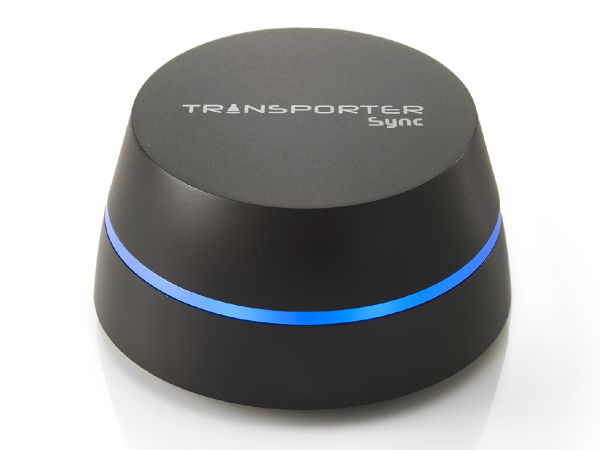Transporter Sync Turns Spare Hard Drives into Cloud Storage
Transporter Sync lets you leave data storage to your own devices, turning your spare external hard drive into a networked cloud-like storage.

Data stored on a hard drive or memory stick is difficult to share with collaborators and friends. But storing data on the cloud can be expensive and comes with a myriad of privacy concerns.
One possible solution is Transporter. Essentially a networked hard drive, Transporter works the same way as cloud-based storage systems like Dropbox and Google Docs, with one important difference: instead of storing data on the company's servers, Transporter saves all of your data on a device kept safely in your own home or office.
This way, your files stay on your home network and don't go through a storage company's servers.
Today, Transporter's developer, California-based Connected Data, announced the Transporter Sync, a cheaper product that lets users connect an extra data storage device to the Transporter network.
MORE: File Sharing After Megaupload: 8 Alternatives
"A lot of the feedback we got from early users is that they had drives laying around, and they'd love to reuse them," Connected Data Vice President of Marketing Jim Sherhart, told Tom's Guide.
The company created Transporter Sync for those customers. The smaller, cheaper device doesn't have any onboard storage; instead, users can connect their own external hard drives or other storage devices via a USB slot.
Sign up to get the BEST of Tom's Guide direct to your inbox.
Get instant access to breaking news, the hottest reviews, great deals and helpful tips.
This makes the Sync a much better deal than a regular Transporter. Compare the $99 Sync, plus a 1 terabyte external hard drive which you can easily find for under $100, with the 1 terabyte Transporter, which goes for $299.
So if the Sync doesn't have any onboard storage, what are you paying for? The device serves as a middleman between your storage hardware and the Internet, with a USB port for an external drive and an Ethernet port for attaching to your home network.
You access files stored on a Transporter-connected device by making an account with Connected Data and downloading its software onto your computer (Mac, PC or Linux) or smartphone (Android or iOS).
Through the software, you can download, upload and back up files of any type to your Transporter storage from any logged-in device. The Transporter encrypts that data as it's transmitted over your Internet or data connection for added security.
Files sent through this network of connected devices never cross Connected Data's servers. That means, even if the NSA issues a warrant for your Transporter data or otherwise compels Connected Data to turn over your files, the company won't be able to do so, because it never had access to your files in the first place, Sherhart said.
All that Connected Data stores about you is an email address and the IP address at which a Transporter is currently located. The company needs to know the IP address in order to enable a connection between the given Transporter and the devices its owners use to connect to the Transporter. It's not a perfect privacy solution, but it does mean that Connected Data has far less access to your personal information and metadata than nearly every other cloud storage service out there.
MORE: NSA-Free Cloud Storage Promised by Finnish Company
Tech-savvy readers will know that it's relatively easy to rig a setup that does just about the same thing that the Transporter and Transporter Sync do, and for much less money.
Connected Data's products offer the advantage of relatively easy-to-use software that mimics cloud storage services but lacks the cloud's monthly fees and privacy concerns. If that's your speed, then Transporter and the upcoming Transporter Sync are worth checking out.
Email jscharr@techmedianetwork.com or follow her @JillScharr and Google+. Follow us @TomsGuide, on Facebook and on Google+.
Jill Scharr is a creative writer and narrative designer in the videogame industry. She's currently Project Lead Writer at the games studio Harebrained Schemes, and has also worked at Bungie. Prior to that she worked as a Staff Writer for Tom's Guide, covering video games, online security, 3D printing and tech innovation among many subjects.
-
videobear I don't see the difference between this and a NAS, except you have to have an account with Transporter for one, and you don't with the other. And the NAS doesn't have a USB bottleneck and a one-drive limitation.Reply -
the1kingbob The difference is this product is probably easier to use. Just make an account, plug stuff in, and done. If I remember correctly a NAS will require a lot more setup to get it to correctly work outside of someones personal network. Probably not to hard to do, but not nearly as simple as this product.Reply -
Junior1234 "Tech-savvy readers will know that it's relatively easy to rig a setup that does just about the same thing that the Transporter and Transporter Sync do, and for much less money."Reply
Would someone please explain how to this less than tech-savvy reader? -
videobear @Junior1234:Reply
"Would someone please explain how to this less than tech-savvy reader?"
There are several ways, but the simplest and least expensive I can think of is: plug an external drive with a USB connection into your computer, and share it with your network/homegroup. No $100 hockey puck required.
